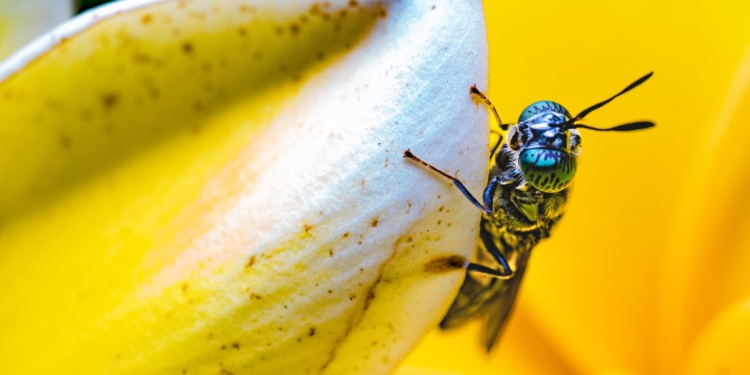Every week, humans could be ingesting between 0.1–5 g of microplastics on average, as per some scientists’ predictions. Every year, plastic pollution is estimated to cost the world $300-600 billion – some even predict it’s much more. And over the past few decades, floating “plastic continents” have been growing in the Pacific Ocean – better known as the “Great Pacific Garbage Patch” – this plastic mass is now thought to be three times the size of France.
These examples barely even scratch the surface of the toll plastic is having on our planet. They also underscore the importance of developing innovative new biodegradable alternatives to curb plastic’s impact on the environment.
Biodegradable plastics are being made in myriad ways from a wide range of materials – e.g., seaweed, sugarcane, cellulose, mushrooms and potato starch, to name a few.
Now, researchers have revealed they’re working on another potential way of producing biodegradable plastics: From a material found in dead bugs that would otherwise have been discarded.
At this week’s fall meeting of the American Chemical Society (ACS), a group of scientists from Texas A&M University presented findings from their research on extracting a polymer sourced from black soldier flies leftover from fly farming, and converting it into functional bioplastics.
What’s more, the group also hopes that these bugs may one day be able to eat the waste biodegradable plastics themselves as well, aligning with sustainability and the circular economy.
Producing Functional Bioplastics From Dead Flies
“For 20 years, my group has been developing methods to transform natural products — such as glucose obtained from sugar cane or trees — into degradable, digestible polymers that don’t persist in the environment,” stated the research group’s Principal Investigator, Professor Karen Wooley, PhD.
“But those natural products are harvested from resources that are also used for food, fuel, construction and transportation,” Wooley explained. It was her colleague, Jeffery Tomberlin, PhD, who pointed her towards black soldier fly farming – a growing industry – where the dead flies would otherwise be wasted.
“Ultimately, we’d like the insects to eat the waste plastic as their food source, and then we would harvest them again and collect their components to make new plastics,” explained Wooley.
“So the insects would not only be the source, but they would also then consume the discarded plastics,” Wooley added.
Chitin is the substance extracted from the flies which the group have focused their research on. It’s a widely abundant biopolymer found within the natural environment — e.g., in the cell walls of fungi or the shell of insects and crustaceans — which is already used in many industrial applications and is typically extracted from crabs and shrimp.
Related Articles: World Environment Day 2023: To Beat Plastic Pollution, ‘Everyone Must Play Their Part’ | Turning Ocean Garbage Into Green Fuel | Why We Should Not Reuse Plastic Water Bottles | How Much Plastic Are We Ingesting?
For example, chitin and its derivative called chitosan have a multitude of biomedical uses – e.g., in tissue engineering or stem cell technology – due to their unique biochemical properties such as being non-toxic, biocompatible, biodegradable, and able to form films, amongst others.
Wooley’s group have been working on the extraction and conversion of chitin into chitosan to make biodegradable plastics. And although other scientists have utilised the larvae of flies (which have other important applications such as in agriculture and aquaculture feeds) as a source of chitin before, Wooley says her group are the first to extract the substance from the otherwise wasted adult flies that she’s aware of.
The group also has plans to further explore how chitin could be used to make other bioplastics, as well as looking into alternative compounds found within black soldier flies which could prove useful starting materials.
Helping Reduce Waste and Water Stress
One member of the research group, Cassidy Tibbetts, highlighted how the group’s fly-extracted chitin seemed purer than other sources, and that it could also help with overcoming seafood allergy-related concerns.
“We’re taking something that’s quite literally garbage and making something useful out of it,” said Tibbetts.
Another member, Hongming Guo, has been able to convert the extracted chitin into chitosan and subsequently into a type of bioplastic known as a hydrogel, which can absorb 47 times its weight in water in one minute.
Hydrogels have been shown to be useful in a wide range of applications within the fields of biomedicine, biomaterials, the food industry and agriculture.
“Here in Texas, we’re constantly either in a flood or drought situation,” said Wooley, “so I’ve been trying to think of how we can make a superabsorbent hydrogel that could address this.”
This biodegradable and superabsorbant product could help by slowly releasing previously captured floodwater to croplands during periods of drought, as well as nutrients for crops as it degrades — without contributing to the global plastic crisis.
These innovative and important findings come as new research from the World Resources Institute (WRI) reveals how 25 countries across the world (home to a quarter of the globe’s population) face extremely high water stress each year, and that for at least one month of the year, at least 50% of the global population live under highly water-stressed conditions — putting lives, jobs, food and energy security at risk.
New data from @WRIAqueduct's Water Risk Atlas finds that 25 countries — home to a quarter of the world’s population — are currently exposed to extremely high #WaterStress annually▶️ https://t.co/aCfF0OjS1Z pic.twitter.com/xeZ05GgDlA
— World Resources Inst (@WorldResources) August 16, 2023
Editor’s Note: The opinions expressed here by the authors are their own, not those of Impakter.com — In the Featured Photo: Black soldier fly on a yellow flower. Featured Photo Credit: oktavianus mulyadi










